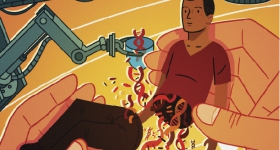Sam Louie, author and licensed mental
health counselor. Photo used courtesy of author.
*Note: To preserve the confidentiality of the
people described, names and other characteristics have been changed.
In September of 2013, James Lee* -- an articulate, 35-year-old
Korean American -- walked into my office. He told me he had no one else to turn to
for help in dealing with his gambling and sexual addictions.
I asked James if he had ever shared this struggle
with anyone close to him. Although he had a strong network of Korean friends and belonged to a Korean American church, he said he was afraid of how they would react if he told them of his addictions.
His wife Stacy had recently discovered his sexual addictions when she found the emails he had exchanged with prostitutes, and that she had begun to distance herself from him. James’s parents learned of his problems when he was forced to explain to them the reason for Stacy’s absence from family gatherings. His dad remained silent. His mom yelled at him: "How
could you? We didn’t raise you to be like this!" Instead of finding support, James
felt ashamed for letting down his family and his community.
He shared the conflicting messages he received
growing up as the eldest child of first-generation Korean American parents who
came to the United States in the mid-1970s. "I
grew up with mixed messages of conditional love in connection to familial
shame, validation, and 'saving face,'" James told me. He believed this may have
contributed to his addictive behaviors. "The contrast between growing up with
these Eastern values while trying to assimilate into the Western culture has
made my internal life a struggle," he said. "This false sense of self is crippling."
This is one cultural distinction
I frequently see in Asian American clients who come to me for counseling. Seeking
help for addictions, while often praised and encouraged in mainstream American
society, is sometimes seen as a major source of shame for individual Asian
Americans, their family members, and the extended Asian American community. For many
Asians, it is terribly difficult to admit to
themselves, their families, and other loved ones that they have a problem and
need help. The mere acknowledgement of the problem goes against cultural norms,
because it sends the implicit message that you have let down your family and
community by not
living up to their rules and expectations.
In addition, this shame is often intricately tied to
the fear of rejection and loss of both familial and cultural community support.
One can see why someone like James Lee would have difficulty telling others
about some of his compulsive and addictive behaviors. His sense of shame is tied to the
fear of being ostracized, and causing disruption to his family and community cohesiveness. As studies have shown, this
concept undergirds many Asian societies, families, and individuals.
Asian identities
are often forged early on in childhood. Shame is frequently used to bring about social order and harmony.
While the Western notion of guilt and corrective behavior
comes from an individual’s development of an internal conscience, in Asian
cultures public humiliation, scorn, or censure might be relied upon more
heavily as discipline. Other
studies suggest that Asian cultures also tend to be more collectivist and less
individualistic by nature, prioritizing
the group’s goals over personal ones. The view of "self" is often seen as relationally
interdependent upon family and the wider community. Thus, shame often has an extremely broad impact for Asian Americans. In many Asian cultures, for this same reason, there is also a stigma against mental illness.
In Lee's case, his mother was experiencing
the shame of her son’s addictions, fearing they would taint the family name. Early on in James's life, his family discouraged the expression of strong emotions such as anger, resentment, fear, helplessness, and sadness. Without a healthy means of releasing these emotions,
many people will turn to various substances or behaviors to meet their
emotional needs. “Since my parents weren’t going to listen to me when I was
upset as a child," James told me, "I realized looking at porn and
masturbating helped relieve those intense feelings.”
But James
also realized the pain caused to him and his family meant that he had to do
something drastic if he was to get past his addictions -- even if that meant
bringing shame upon himself and his family. Facing his gambling and sexual
addictions required breaking his silence, bringing others in, and seeking help. In doing so, James
was eventually able to reduce the level of shame he felt -- not just by acknowledging his
struggles with me, his therapist, but also by sharing them with other men in
group therapy. Along the way, he found the support, validation, and encouragement he needed. It required him to take the enormous step of breaking the cultural code of silence and risk bringing shame on his family, but the acceptance
and understanding he found in therapeutic circles allowed James to emerge with
a renewed sense of confidence and hope on his road to recovery.
***
Sam Louie is a licensed mental
health counselor with a private practice in Seattle specializing in addictions
and multi-cultural issues. Sam is also an Emmy Award-winning former broadcast
journalist who has researched, produced, and reported on a number of stories
related to ethnicity, addictions, and psychotherapy. Find him on Twitter here.









Comments